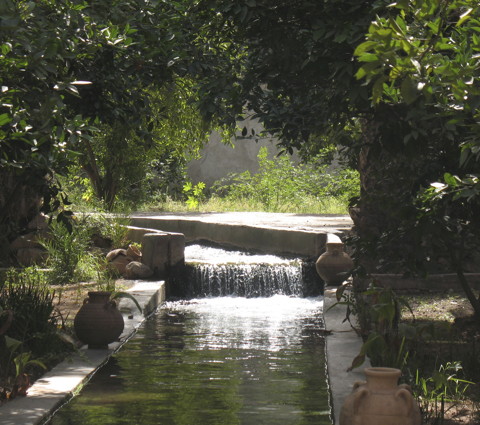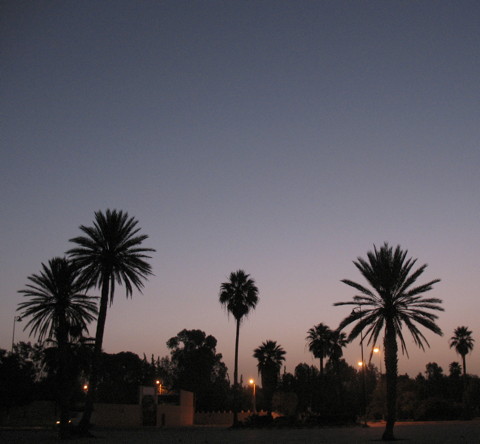Postcards from Morocco
February 2013
Linda & I had booked a week's holiday in Taroudant (or Taroudannt, opinions differed
on which was correct), a small town in Southern Morocco. The primary impulse had been to
find some restorative sun & (hopefully) warmth after what had been a long, grey, wet
winter but not to break the bank to do so. Some friends had been to Morocco on a
trip that incorporated visits to local projects & community initiatives which
sounded fascinating, so we booked up with the same organisation and on a dull February
morning found ourselves flying to Agadir.

Being met at the airport is a wonderfully reassuring way to start a trip to a new
country, no need to wrestle with unfamiliar ways before you've had a chance to arrive.
Maybe this isn't the outlook of the true voyager but I prefer to soak up the atmosphere
of a new place before I start to engage with it. Anyway, the tall & austere Said was
there with a sign that approximated to our names and after collecting our fellow
vacationeers and doing some money changing (no dirhans available outside Morocco!) we
were loaded up in the minivan and heading inland.
An hour later we came to Taroudant, ringed with tall, crenellated walls and lined with
broad walkways & wide avenues, standing proud & splendid in the scrubby open
'fields' stretching away on all sides. A pristine and majestic desert stronghold with a
sense of timeless grandeur.
Inside things were a little different, in the way that night & day are. The
narrow, twisting streets wove between tall buildings and were ABSOLUTELY CHOKED with
every form of traffic - cars, trucks, three-wheeled things that looked like motorbikes
grafted onto their trailers, horse-drawn carriages, donkeys (either pulling carts,
loaded up or being ridden), mopeds of every shape, style & age, bicycles beyond
counting and pedestrians squeezed into every remaining bit of free space. It wasn't as
noisy as a British street - there were fewer engines and nobody was going particularly
quickly - but the sense of (almost) chaotic motion all around had its own dramatic
impact on the senses.
Our minivan somehow found space to enter this mêlée and wove its way
through the town to a quieter area where our guesthouse was sited. We emerged to
friendly greetings and after unpacking & showering tucked in to the first of our
tagine dinners. We'd reached our base camp - the mysteries, delights &
secrets of Morocco awaited us!

Goats in trees
What else can you say?
OK, maybe this does need some explanation. The plains (and the slopes of the
mountains) around Taroudant were covered by Argan trees, a species that (almost) only grows in
the Souss valley of Morocco. This tree fits a similar ecological niche to the olive -
hardy, drought-tolerant and with a valuable oil harvest. As there's often little else to
eat the local goats have learnt how to climb the trees to get to the higher leaves and
we'd often see them bizarrely perched high up, munching away steadily.
Small herds of goats and/or sheep (they couldn't climb the trees) were everywhere in
southern Morocco, always accompanied by a shepherd or two. Once outside the city walls
we'd see them every couple of minutes, often just off the side of the road, from half a
dozen animals to flocks of more than fifty. The shepherds were as often women as men.

Tiout market
This rural market was held inside a walled area of waste ground (actually it looked
just the same as the surrounding land but with no trees) about the size of a football
field. The stalls were all fruit & veg with a row of small butchers kiosks at one
end and a long, low terrace of unmarked doors up the side with bicycles & mopeds
stood outside. The shoppers and stallholders were almost exclusively male and mostly
in traditional dress although the children & adolescents were in jeans, football
shirts and hoodies. A stall near the entrance sold nothing but crisps & snacks, their
metallic wrappers strangely harmonising with the bright colours of the more organic
produce on sale.

Rides for the boys
Just outside the market there was a man with four mainature motorbikes who seemed to
be offering rides to the local boys. One at a time they would climb on, drive (with
varying degrees of speed & ability) along the length of the wall, the carefully turn
around and drive back again. From the outside this looked like a serous comercial venture
rather than a benevolent uncle or designated childminding adult. As you might expect there
were no helmets, gloves or any form of safety equipment being used.

Oasis
When I heard we were going to an oasis I immediately envisioned a clump of palm trees
surrounded by sand dunes off to the horizon in all directions, maybe with a few tethered
camels. The reality was quite a large cultivated area, richly green against the red-brown
land that we'd driven through to get there, with a big reservoir at one end and a small
town at the other. A ruined casbah (castle) sat above it on the hilltop, it's majesty
somewhat compromised by one end being converted into a hotel with modern styling.
Our walk through the oasis ended at a seemingly deserted café but Said, our guide,
quickly summoned up the proprietor who provided cold drinks to go with our picnic
lunch. The irrigation channels that fed water through the fields also ran through the
premises giving a wonderfully cool & refreshing atmosphere and a real sense of how
precious this resource was in the (comparatively) arid surroundings.
Our presence quickly drew a number of cats who had obviously learned how to milk tourists
as effectively as the stallholders in the souk. A pleasant shared lunch was enjoyed by
all.

Taxis
I'd been puzzling over why pea green and pale blue were such popular colours for the
many, slightly ageing, Mercedes we'd seen on the roads before eventually the penny
dropped - these were taxis rather than private cars. They provided town to town transport
while Petit taxis (invariably small, white Peugeots or
Citroëns) worked within the town boundaries. A driver would stop to pick up extra
passengers if they were going the same way but only if they were the same gender as those
already inside - although as tourists we were treated as something completely separate
and were never expected to share. I would imagine that the fares were similarly adjusted
for us although they were so cheap that it really made no difference.

Cliff houses
On a trip to the coast we passed these dwellings - half dug into the cliffside, half
constructed outside. Originally used by fishermen they are now apparently mostly used by
surfers.

Sea fishing
The long, sandy beach didn't look like a particularly good spot for fishing but this
local angler seemed to be doing pretty well in filling his bucket with sizeable fish.

Outside & inside
Something that really struck me about Morocco was the contrast between private and
public spaces. Indoors (or in enclosed gardens) everything was clean & carefully
tended, outside it ranged from functional to dirty to rubbish tip, often just yards away
from each other. Roads had margins of plastic bags & bottles stretching away on
either side, litter collected in every unused space in the town and the outside of the
walls seemed to be a collective dumping zone with the plastic bags often torn apart by
goats looking for something edible. I assume the desiccating sun stops these dumps
becoming a health hazard - few of them were particularly smelly - but it did give a
rather grimy impression to the town.

The birds
This majestic (& seemingly deserted) building in the middle of town was regularly
crowned with white birds (apologies - I don't know what species) who would wheel around
the sky before settling back to roost on the roof.

Morning & evening
One of the big differences between Taroudant and life back home was in how people
treated the ends of the day. Morning was a time of great activity, starting after the
dawn call to prayer, while in the evening the town would empty with virtually nothing in
the way of night life.
Both times were interesting for me as I would pull up my hoodie and no longer be such an
obvious tourist - with jeans & trainers and my face hidden I could pass as a local, at
least at first glance. It was also nice to wander the streets without the crowds, noise
and dust of the day and to get a taste of an earlier, distant time.

Market day
Sunday was market day and the road out of the north of the town was filled with all
manner of vehicles & pedestrians making their way out to the large, walled plaza
for the weekly bazaar. This was a proper rural market with livestock a large part of it
which made it a bit daunting for a poor, squeamish urbanite like myself. The animals
didn't seem to be being mistreated but their plaintive bleating set a rather disconcerting
background tone to the whole thing.
The market had its own progressive geography with the big stalls in the centre surrounded
by smaller & smaller ones outside, down to kerbside sellers on the road with a few
handfuls of vegetables or herbs.











